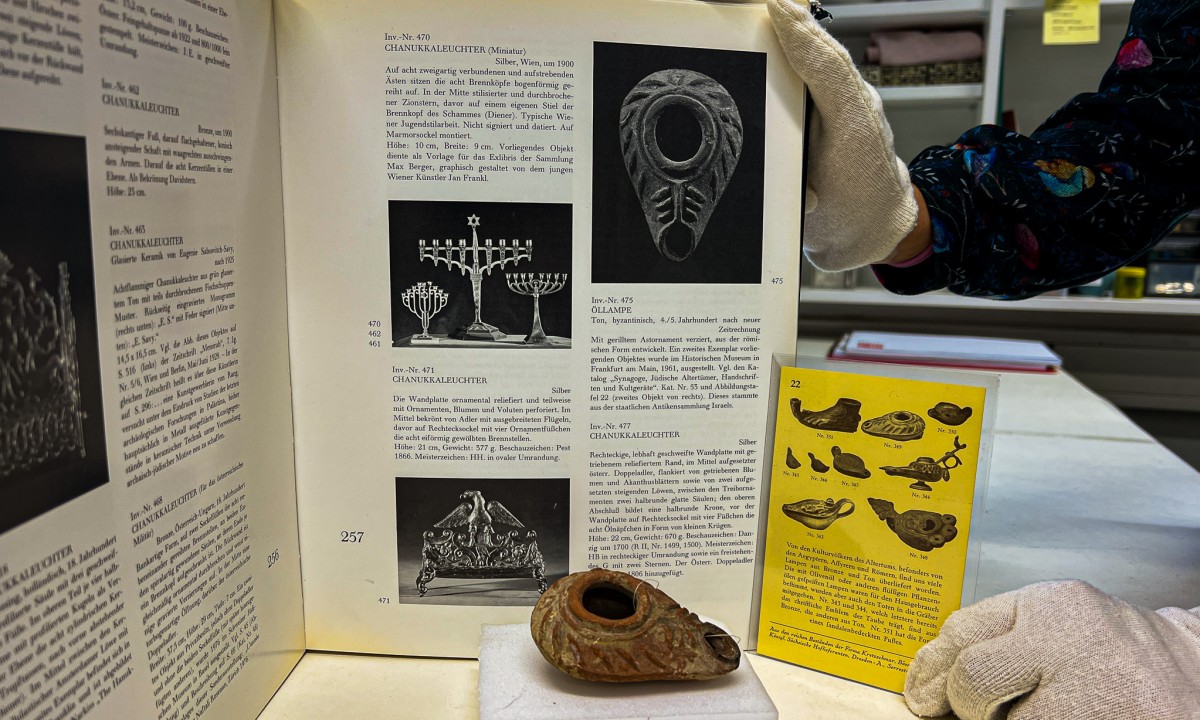20. December 2022
Celebrate
Oil for eight days
by Sabine Apostolo
Hanukkah literally means “dedication.” In most cases, this refers to something taking place for the first time. However, the Hanukkah festival celebrates the second dedication of the Second Temple in Jerusalem. This was built after Jewish women and men returned from Babylonian exile in the sixth century BCE. 300 years later, a fierce culture war raged between Judaism and the meanwhile Hellenistic surroundings, eventually leading to armed struggle. The Jews were defeated by the Seleucid army, who forbade them from practicing their religion and rededicated their temple to Zeus. One day, however, a rebellious community formed around Mattathias and, after his death, around his son Judas, who was given the surname Maccabee. In the year 164 BCE, they recaptured the temple, which went down in history as the Maccabean Victory.
They wanted to rededicate their temple as soon as possible, for which they needed oil for the temple menorah. But all they found was a bottle of olive oil with the High Priests’ seal still intact. Although they knew that this would have been enough for one day at most, and that it would have taken them at least eight days to get a new supply, they did not want to wait for the second dedication of their temple. So, they lit the menorah, which is supposed to always burn without interruption, knowing that the light would go out again after a day. And then the miracle happened: the oil kept burning and burning and did not run out until the replenishment arrived eight days later.
Today, the Hanukkah menorah, with its eight cups or candle holders, commemorates this eight-day miracle. There are numerous such candelabras in the collections of the Jewish Museum Vienna. One of these collections is that of Max Berger, who began collecting Judaica in the 1960s. This antique-looking oil lamp is in his collection. It actually serves no religious purpose and has no obvious connection to Judaism. This lamp probably reminded Max Berger of the miracle of the cruse of oil which Hanukkah celebrates. He might have thought there was no harm in owning a piece of antiquity, possibly even from the time of the Maccabean Revolt. Perhaps he even bought it during the oil crisis of the 1970s and chuckled at the idea of such a necessary oil miracle.
Max Berger was by far not the only person with an interest in antiquity. A market for such apparently ancient oil lamps already existed around 1900. Kretzschmar, Bösenberg & Co, a company headquartered in Dresden, mass-produced these items and advertised them on postcards. It is highly probable that the oil lamp from the Berger Collection also originated from this firm. The fascination with antiquity, which was by no means limited to Jews, is evident on the postcard. However, they were probably the only ones to associate it with the miracle of the cruse of oil. But the longing for such a miracle involving oil is not unique and, unfortunately, anything other than history.
They wanted to rededicate their temple as soon as possible, for which they needed oil for the temple menorah. But all they found was a bottle of olive oil with the High Priests’ seal still intact. Although they knew that this would have been enough for one day at most, and that it would have taken them at least eight days to get a new supply, they did not want to wait for the second dedication of their temple. So, they lit the menorah, which is supposed to always burn without interruption, knowing that the light would go out again after a day. And then the miracle happened: the oil kept burning and burning and did not run out until the replenishment arrived eight days later.
Today, the Hanukkah menorah, with its eight cups or candle holders, commemorates this eight-day miracle. There are numerous such candelabras in the collections of the Jewish Museum Vienna. One of these collections is that of Max Berger, who began collecting Judaica in the 1960s. This antique-looking oil lamp is in his collection. It actually serves no religious purpose and has no obvious connection to Judaism. This lamp probably reminded Max Berger of the miracle of the cruse of oil which Hanukkah celebrates. He might have thought there was no harm in owning a piece of antiquity, possibly even from the time of the Maccabean Revolt. Perhaps he even bought it during the oil crisis of the 1970s and chuckled at the idea of such a necessary oil miracle.
Max Berger was by far not the only person with an interest in antiquity. A market for such apparently ancient oil lamps already existed around 1900. Kretzschmar, Bösenberg & Co, a company headquartered in Dresden, mass-produced these items and advertised them on postcards. It is highly probable that the oil lamp from the Berger Collection also originated from this firm. The fascination with antiquity, which was by no means limited to Jews, is evident on the postcard. However, they were probably the only ones to associate it with the miracle of the cruse of oil. But the longing for such a miracle involving oil is not unique and, unfortunately, anything other than history.

